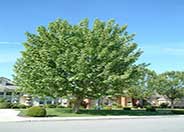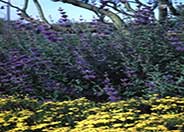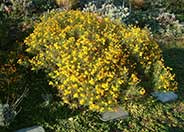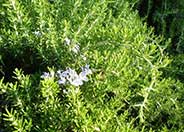
Common name:California Sycamore
Botanical name:Platanus racemosa
The California Sycamore is a fast growing deciduous tree that reaches up to 40'-50' high. It tolerates heat, smog, and drought conditions as well as moist conditions; it is native to riparian areas. It has interesting mottled bark when the tree is bare in winter.

Common name:Cleveland Sage
Botanical name:Salvia clevelandii
The Cleveland Sage is a perennial shrub that grows 4' tall and wide. It has fragrant gray foliage and blue flowers that bloom between May and August. This shrub needs full sun and prefers well drained soil. The Cleveland Sage is native to California and is drought tolerant. -Cornflower Farms

Common name:Perennial Marigold
Botanical name:Tagetes lemmonii
This larger perennial will grow to 6' tall and has small, light green leaves with yellow mustard colored flowers that bloom in winter and spring. Cut back to within 6" of the ground to refresh and reduce the size of the plant. This plant is a riot of color!

Common name:Rosemary
Botanical name:Rosmarinus officinalis
Rosemary is hardy in full sun areas where winter temperatures do not drop below 10 degrees F. They can be grown in a clay pot with well-drained, porous soil in bright indoor light, and will also flourish on the backporch in spring, summer and fall. Its beautiful, slowly trailing stems and shiny slender leaves are perfect for showing off the small, light blue flowers that blossom in the summer. -Holland WIldflower Farm
Compost for Healthy Soil and Plants
The natural world works in cycles. Everything is changing form and moving from place to place in an endless energy exchange system. The leaves and twigs that fall to the ground, not to mention other life forms that might die, decompose and combine with water, air and minerals of the soil to create a medium for future plants.
Click in the green box for more information
| Designer: | Yellow, Blue and Beyond |
Photographer: GardenSoft |
Soils and Compost:
Maintain a two to four inch layer of mulch on the soil surface to reduce weeds, infiltrate rain water, and reduce compaction.
Water Saving Tip:
Mulching and adding compost to soil can minimize evaporation and help soil absorb and store water.
Integrated Pest Management:
Attract, or buy beneficial insects such as ladybugs and lacewings to control pest outbreaks in your garden.

